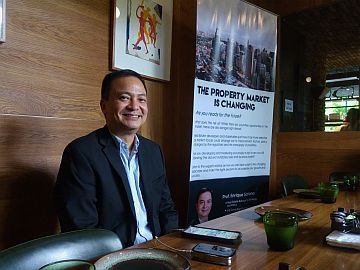Property expert urges new developers to reconsider going into condominium projects

Eric Soriano, executive director and corporate turnaround advisor at the Asean-based Wong+Bernstein Group (W+B), shares his views on the local property sector.
CDN PHOTO/VICTOR SILVA
While the country’s property sector continues to grow, it isn’t expanding as fast as before, prompting a real estate consultant to warn aspiring entrants into the industry to reconsider their plans while they still can.
Professor Eric Soriano, executive director and corporate turnaround advisor at the Asean-based Wong+Bernstein Group (W+B), gave this warning as he noted an alarming influx of new players venturing into the real estate industry and riding on the sector’s burgeoning expansion.
“There is a concern on the entry of newly-minted and unqualified players who were not property players before, but just so happened to own a property that they decided to develop,” Soriano said in a recent interview.
W+B is an Asia Pacific-based business advisory firm whose clients range from Asia’s top 500 corporations to the country’s small and medium enterprises (SMEs).
Soriano was in Cebu City last week to meet with local media and announce an upcoming seminar in Manila on November 28 titled “The Property Market is Changing – Are you ready for the future,” which aims to advise real estate developers and stakeholders on how to best adapt to the changing landscape of the property market.
Soriano said that there is already a looming oversupply of condominium units in the country and an expected increase in overall vacancy rate owing to this future surge.
The build-up in the demand for high-rise condominium units began in 2011, with existing property developers shifting to vertical projects due to the promise of higher margins and less regulatory restraints.
Private consumption fueled by overseas remittances and the vibrant business process outsourcing sector has helped drive the country’s real estate sector over the years, Soriano said.
He estimated the condominium inventory in Cebu to only have been 7,000 to 8,000 three years ago, but has now grown to over 17,000 today.
Data from the Philippine Statistics Authority (PSA) show that the country’s real estate industry increased in value by 13.83 percent in 2017 while construction of properties has increased by 7.1 percent this year compared to 2016.
According to the JLL Property Digest 2017, there are still 35,101 available properties in the Philippines.
But the property boom, Soriano said, has already been overextended for three years and that whatever the gains were during that period were already a bonus.
He also noted that the condominium market started to slow down two years ago, with sales velocity and uptake no longer as robust as before.
“At this point, some developers want to shift or go back to developing horizontal projects already,” he said.
He said this sends a strong signal to new entrants into the condominium scene to reconsider moving because trying to take advantage of the very competitive condominium market may not be a good idea.
Instead, he urged them to focus on the horizontal housing market where there is still a huge demand.
Soriano pointed out that the horizontal market remains resilient because price points highlight the unmet demand, from socialized housing to even mid-end.
“There is no cause for worry for horizontal developments because these are resilient, future-proof assets that are solid and sustainable. Price points are going to thrive,” he said.
According to the OLX Data Hub, Cebu has a growing upscale inventory, but the demand is still highest for affordable properties.
Most Cebu-based buyers prefer empty lots (34 percent), followed by single-attached house and lot units (25 percent), and single detached house and lot units (15 percent).
Soriano also urged relatively new players to revisit their five-to ten-year development plans to incorporate contingencies by pivoting to horizontal developments.
He added that they need to look at their business models again and that it was necessary to innovate, especially since the market is getting tougher.
“They need to pivot and expand their portfolios as well as start looking at other asset classes,” he said.
To keep up, he advised developers to think strategically and come up with a good product that offers an experience.
He said even the big players recognize that competition in real estate is getting more intense and that it will become even more so if they do not change the way they do things.
Soriano explained that the “big boys” don’t have much to worry about because they can always easily shift to more stable markets; but smaller developers are always the first casualties if a market crashes.
“If a developer does nothing, it will be downhill for them,” he said.
Disclaimer: The comments uploaded on this site do not necessarily represent or reflect the views of management and owner of Cebudailynews. We reserve the right to exclude comments that we deem to be inconsistent with our editorial standards.
